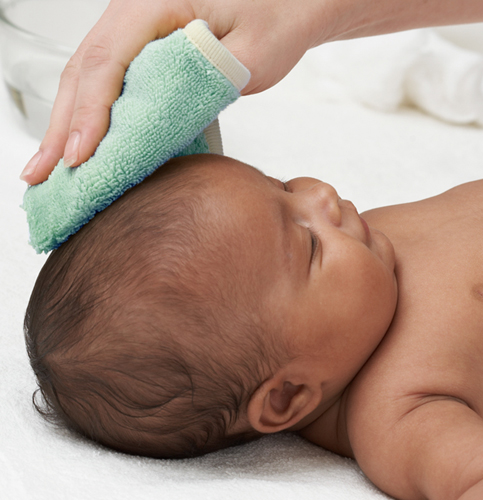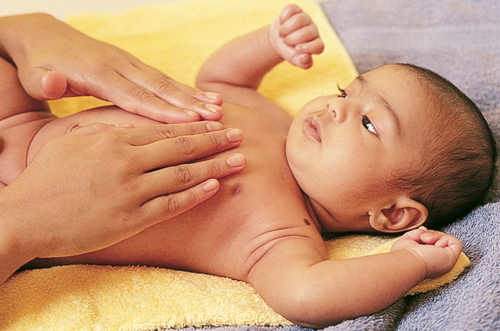When to See your Doctor
No matter what your baby’s
age or your level of experience, you should learn which symptoms demand
a call to your baby’s doctor—or, in some cases, emergency services.
Always call your doctor if your baby:
Has a stiff neck
Persistently vomits
Is vomiting or has diarrhea longer than six hours in a small baby, or 24 hours in a baby over three months of age
Has a rash on his skin, particularly if it appears suddenly
Is under three months old and has a fever over 100.4°F (38°C); in babies three months or older use your judgment
Has a temperature that is higher than 102°F (39°C) at any age
Has a tender or unusually sensitive or sore-looking belly button or penis
Is suffering from dehydration
Fails to have bowel movements
Has a cold that interferes with feeding, or with yellow or green discharge
Has a persistent or painful cough, and always if there is mucus coughed up
Pulls or tugs on his ears, and cries when feeding
Has discharge from his eyes
Call an ambulance if your baby:
Baby-proofing your Home
Before you know it, your
baby will be rolling over and crawling, and even young babies can be
hurt if there are hazards in your home. Prevent accidents from happening
by making your home as safe as possible as soon as possible—even before
he is born, if you can.
Make sure your baby’s crib has a new mattress that fits snugly
Make sure all screws and bolts are secure, so there is no danger of the crib collapsing, and your baby won’t be scratched if he rolls near them
Ensure that there are no strings or electrical cords hanging anywhere near your baby’s bed, changing table, play area, or chair
Avoid using pillows, thick bedding, or electrical items in your baby’s crib
Keep all lamps and everything else electrical at least 3 feet (1 meter) from your baby’s bed
Remove a mobile from the crib once he can reach up and touch it
Consider using a safety belt on your baby’s changing table
Put a carpet or rug at the base of the changing table to cushion any falls
Keep small coins, anything sharp, and anything that poses a risk to your baby (such as choking, strangulation, or injury) out of reach
Place all medication, cleaning supplies, alcohol, laundry supplies, and toiletries in a child-locked cupboard that is out of his reach
Place houseplants out of reach
Cover electrical outlets with plastic covers
Install safety gates securely at the top and bottom of stairways
Consider getting a fire guard if your fireplace is regularly in use
Place plastic guards on the corners of coffee tables and other furniture of baby height
Secure bookshelves and chests of drawers to the wall—many babies become avid climbers very early on
Coping with Common Ailments
Almost every baby
suffers from one or more common ailment when young, and it’s all part of
the process of making the immune system stronger and more efficient.
Nonetheless, it can be alarming to see your baby ill, and having the
tools to ease her discomfort and put her on the road to recovery can
make things much easier.
Reducing a fever
Remember that a fever is a
positive sign that your baby’s immune system is working effectively,
raising the body temperature to make it inhospitable to germs and
viruses.
Offer plenty of fluids: babies can quickly become dehydrated by intense fevers
Offer acetaminophen if your baby is over two months old or, if she’s younger, ask the doctor if it is appropriate—a medicine syringe makes it easier to measure and administer
Keep her warm, but make sure she doesn’t overheat—layers of cotton clothing and blankets are best
Check your baby’s temperature regularly with a thermometer; seasoned parents may be able to detect a fever by feeling their baby’s skin, but this is not always accurate enough
It can take a few days for your baby to fight off the infection causing her fever, so keep her comfortable and well hydrated as you both sit it out
Cooling measures
Sponging your baby with
tepid water will help to bring down her fever. Allow the water to
evaporate from her skin, rather than drying her, and then dress her in
light clothing. If she still feels hot, apply tepid compresses to her
forehead, removing them when they absorb some of her body heat.

Croup
The characteristic cough
of croup is a definite loud bark or whistle, caused by inflammation of
the vocal cords—because the larynx swells and blocks the passage of air,
breathing can be difficult, which can panic your baby and you. Croup
can be the result of a bacterial or viral infection, or even just a
cold.
Raise the head end of your baby’s crib by placing a towel or pillow under the mattress; this should ensure easier breathing
Try steam inhalations (filling the bathroom with steam is useful) as these will help to open the airways and encourage breathing
Use a cool-mist humidifier
in the baby’s room to help keep the nasal mucus more liquid—place it
near her so she can take advantage of the additional moisture; clean
daily to prevent mold buildup in the vaporizer
Use saline nose drops (non-medicated) to help loosen the thick mucus in your baby’s nose
Your doctor may prescribe a course of steroids for your baby, which can reduce swelling
Vomiting and diarrhea
These can occur in tandem
or on their own. There are a multitude of causes, including gastric
reflux, ear infections, coughs and colds (which produce excess mucus),
fever, gastroenteritis, and even overfeeding.
Continue offering regular feeds:
bottle-fed babies should be offered plenty of fresh, cool, previously
boiled water in a sterilized bottle; you may also want to try a
lactose-free formula, which can be more easily digested
Massage your baby with a little warm olive or grapeseed oil—this will help to soothe her and reduce any cramping or discomfort
Scrupulously clean everything with which your baby comes into contact
Your doctor may recommend a fluid replacement (oral rehydration solution) if your baby is suffering from dehydration
Colic
Colic is characterized
by apparently unending frantic crying, usually at around the same time
of day or night—your baby will draw his legs up to his abdomen and he
will appear to be in severe pain.

Remember, if you are breastfeeding,
your baby may be irritated by something you ate and become temporarily
fussy; for example, onions, cauliflower, and broccoli can cause your
baby to experience gas
Note symptoms that appear after feeding
and discuss them with your doctor—babies can occasionally be allergic
to foods passing through their mother’s breast milk, such as cow’s milk
or eggs, resulting in an upset tummy
Your doctor or pharmacist may suggest antispasmodic solutions, which will reduce discomfort
Add a drop of lavender to a warm bath to help to ease symptoms and calm a distressed baby
Use the same oils in a gentle massage of the abdominal area—do this before the evening feed so that your baby is relaxed and calm
Some parents suggest avoiding particular foods, including very spicy foods, citrus foods, gassy foods (beans, cabbage, onions, etc), and sugar
Colds and coughs
A streaming or congested nose and a cough can make feeding difficult, so keep your baby slightly upright when offering a bottle or nursing
Use a vaporizer in your baby’s room,
with a few drops of eucalyptus essential oil to help ease the
congestion; alternatively, a few drops in a bowl of water on a radiator
will help
Feed little and often, ensuring he gets enough without becoming distressed
Offer acetaminophen to help ease discomfort and bring down a temperature
Cradle cap
Cradle cap is characterized by
a thick, encrusted layer of skin on your baby’s scalp; there will be
yellow scales, which form in patches—in severe cases cradle cap can last
for up to three years.
Massage the scalp with your fingers to improve scalp circulation and loosen scales
Mineral oil can be massaged into the scalp each evening, and then gently shampooed away after a few minutes to nourish and soothe
Alternatively, massage olive oil into the scalp each evening, and then gently shampoo away in the morning to nourish and soothe; over-washing will make the condition much worse
Try not to loosen crusts that have not pulled away on their own as bleeding and infection may result; gently brush away loosened crusts
Your doctor will prescribe a mild ointment containing an antibiotic and corticosteroid if the skin becomes inflamed or seems infected